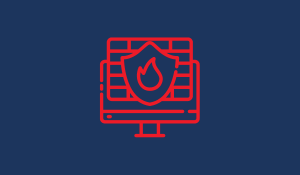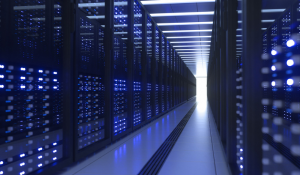Protecting Your Business: The Power of Next-Generation Firewalls
Welcome to a deep dive into the world of cybersecurity and network defence. In an era where the digital landscape is as dynamic as it is...

Are you ready to fortify your digital defenses and safeguard your network from cyberattacks? Look no further than the network firewall. A formidable barrier stands between your valuable information and the potential threats of the digital landscape. This barrier allows you to navigate with confidence and peace of mind.
| TABLE OF CONTENT |
We will clarify definition of firewall, show you its most popular times, how does it work. Additionally, we will provide you with 8 best practices for effective usage, empowering you to maximize the protection of your digital assets. Let's dive in and fortify your cybersecurity against cyberattacks!
First, we should explain the basics and answer the question; what is a firewall? A firewall is a computer security network that monitors, controls, and restricts in- and outgoing internet traffic. It also decided whether to authorize or block a specific traffic defined by a set of security rules.
The main reason of it, is to set a barrier between your internal network and external traffic to block malicious problems such as viruses or potential hacking attacks. It can be seen as a gatekeeper which lets or prohibits web activity to your private network.
A firewall functions as a network security mechanism, overseeing and regulating the flow of incoming and outgoing network data according to predefined security protocols. Ordinarily, a firewall creates a protective boundary between a reliable network and an unverified network, such as the Internet.
Firewalls and antivirus software’s are providing security to our systems, but there are slight differences between them.
Antivirus software is a component of network security to provide security from malicious software. On the other hand, firewall is a necessary software or firmware which prevents unauthorized access to a network.
Antivirus software is based on detection, identification and removal. Firewall checks in- and outgoing traffic which blocks threats.
Operating systems: Most modern operating systems, such as Windows, macOS and Linux, have built-in software firewalls. These firewalls can often be activated, configured and managed via the system settings.
Security software: Third-party antivirus and security suites often offer firewall capabilities as well. This software can provide additional layers of protection by monitoring and blocking or allowing outgoing and incoming data connections.
Routers and network hardware: Many routers have built-in hardware firewalls that can monitor and control traffic between your local network and the Internet. These firewalls can be configured in the router's settings.
Corporate networks: In corporate environments, specialised firewall devices are often used to monitor and control network traffic. These devices can be part of a broader network security strategy.
Firewalls can be based on a software or a hardware however, the best practice is to have both. A software one is the one which is installed on the computer or the server. It is easier to set up and maintain and it has smaller effect on the user experience.
On the hand, hardware firewall is located between the network and devices, and it is the physical hardware, installed between them. But it requires skilled employees to install it and manage it.
They are also based on their filtering methods, structure, and their functionality. Find out more about them:
Packet Filtering – examinates source packets addresses and disallows them from passing through.
Proxy Service Firewall – defends the network by filtering messages at the application level. It works as an intermediary between two end system.
Stateful Inspection – either allows or blocks network traffic based on its state, port and protocol by filtering based on the administrator defined rules.
Next-Generation Firewall – includes deep packet inspection which allows it to examine the data and its packet.
Unified Threat Management Firewall – uses an integration of stateful inspection firewall, intrusion prevention, and antivirus as well as other additional services such as a cloud management.
Threat-Focused Next Generation Firewalls– detects evasive or suspicious behaviour by advanced threat detection, network, and endpoint correlation.
Firewall as a Service - is a cloud-based security solution that provides scalable and centralized firewall protection, enabling organizations to secure their networks without relying on traditional on-premise hardware.

A "hardware software" is not a specific technical name or term. It seems to be more of a confusion or combination of the terms "hardware" and "software", both of which are basic components of computers and electronic devices.
Hardware: This refers to the physical components of a computer or electronic device. This includes things like processors, memory, hard drives, monitors, keyboards, mouse devices and more. Hardware is the actual material that computers and devices are built from.
Software: These are the non-physical instructions or programs that run on the hardware to perform specific tasks. Software includes operating systems, application programs, drivers and more. They are the instructions that control hardware and make it perform certain functions.
So probably now you might be wondering, why firewall is important for your cybersecurity. Firstly, a network without any protection is exposed to any traffic, both safe and malicious, to access your system. And they will provide a protection to your private or business computer.
They monitor network traffic by analysing it and levering rules. With the set of rules, it filters against potential phasing attack, malware, ransomware, identity theft, social engineering attack and silent hacker attacks.
They offer proactive protection while also going beyond classic defence mechanisms used in cybersecurity.
Nowadays, they offer more control, better transparency and advanced ability to manage data and ingoing information.
This defence mechanism has a simpler infrastructure so IT teams can expand their policies.
Firewalls are providing faster response time as well as easy updates.
Firewalls and antivirus software are both essential components of a robust cybersecurity strategy, but they operate in distinct ways to protect your systems. While a firewall acts as a gatekeeper for network traffic, controlling what enters and leaves your network, antivirus software focuses on detecting and eliminating malicious software that has already made its way onto your devices. Understanding their differences is key to implementing a comprehensive defense.
|
Feature |
Firewall |
Anti-virus |
|
Primary Function |
Monitors and controls network traffic based on predefined security rules, blocking unauthorized access. |
Detects, isolates, and removes malicious software (malware) such as viruses, worms, and ransomware. |
|
Scope of Protection |
Acts as a barrier at the network perimeter (or on individual hosts) to filter incoming and outgoing connections. |
Operates on individual devices (endpoints) to scan files, programs, and system activities for threats. |
|
Threat Detection Method |
Analyzes network traffic (packets) based on source/destination, port, and protocol. More advanced firewalls also inspect application layer data. |
Primarily relies on signature-based detection (identifying known malware patterns) and heuristic analysis (detecting suspicious behavior). |
|
Timing of Action |
Proactive; prevents malicious traffic from entering or leaving the network. |
Reactive; acts upon malware that has already entered the system. Can also offer proactive real-time scanning. |
|
Implementation |
Can be hardware-based (dedicated devices) or software-based (installed on operating systems or servers). |
Primarily software-based, installed on individual computers, laptops, and mobile devices. |
|
Focus |
Preventing external threats and controlling network access. |
Protecting against internal threats (malware infections) and removing them. |
A network firewall analyses incoming traffic by the set of special parameters to find unsecured or suspicious sources to prevent any possible attacks or viruses. It creates ‘ports’ for incoming traffic and differentiates it between good and bad packets which later is allowed or blocked.
A firewall analyses incoming traffic using special parameters to find unsafe or suspicious sources and prevent possible attacks or viruses. It creates ‘ports’ for incoming traffic and distinguishes between good and bad packets, which are then allowed or blocked.
Essentially, a firewall acts like an intelligent traffic cop for data packets in your company network. Every time information enters or leaves your network, the firewall meticulously checks these ‘data packets’ against a set of rules. This process can be broken down into the following steps:
Address checking: The firewall analyses the source and destination addresses (IP addresses) and the associated communication channels (ports) of the data packets. This allows it to control which devices and applications are allowed to communicate with each other.
Content inspection: Depending on its configuration, the firewall can also inspect the actual content of the data packets to detect malicious patterns or known attack signatures, for example.
Analysis of the protocols: The firewall monitors the communication protocols (e.g. TCP, UDP) and application protocols (e.g. HTTP, SMTP) used to ensure that data transmission complies with the expected standards and that no unusual activity takes place.
A packet in IT security refers to a data packet. It is structured for internet transfer and contains information about itself. Firewall detects whether the packet obtains correct details which are set in the rules. Filtering of these data packets is based to the following factors:
Source and destination elements are defined by ports and internet protocols (known as IP addresses) which is always distinctive device name for each host. Filtering data packets helps firewalls to decide if this packet can be blocked or authorized.
Effectively managing your firewall is paramount to maintaining a strong cybersecurity posture. A properly configured and maintained firewall acts as a critical line of defense against a multitude of cyber threats. To maximize the protective capabilities of your firewall, it's essential to implement and consistently follow a set of best practices.
Regularly updating your firewall software and firmware is the most critical practice. These updates often include patches for newly discovered vulnerabilities and improvements to threat detection capabilities, ensuring your firewall can effectively identify and block the latest threats.
Enforce your human firewall by raising cyber security awareness among your employees with e.g. DriveLock Security Trainings. Educating users about phishing attempts, social engineering tactics, and safe browsing habits, such as through programs like DriveLock Security Trainings, reinforces your technical firewall.
To strengthen your cyber security, also use antivirus software. While the firewall controls network traffic, antivirus software protects individual devices from malware that might bypass the initial network defenses. Using these security tools in tandem provides a more comprehensive and layered approach to safeguarding your digital assets.
It is recommended to specifying source IP, destination IP addresses and destination ports. This allows you to control exactly which traffic is permitted or denied, minimizing the attack surface and reducing the risk of unauthorized communication.
Another good practice is conducting regular audit of your firewall software. Regular audits help identify outdated or overly permissive rules that could potentially be exploited.
By default, block all traffic and allow only a specific traffic. This "default deny" approach significantly reduces the risk of unauthorized access compared to a "default allow" policy where you block specific threats.
Grant your users only minimal level of access required for their duties. Limiting user privileges reduces the potential damage if an account is compromised and restricts lateral movement within your network.
Activate network redundancies to avoid downtime. Implement redundant firewall systems to ensure continuous protection and prevent network downtime in case of hardware failures or maintenance. This high availability setup maintains your security perimeter even during unexpected events.
By implementing robust firewall solutions, businesses can significantly reduce the risk of data breaches and unauthorized access to their systems. However, it's important to remember that they are just one piece of the security puzzle.
A Next-Generation Firewall (NGFW) is an evolution of traditional firewall technology that provides more advanced features and capabilities to better address modern network security threats. NGFWs combine the traditional functions of a firewall, such as packet filtering and port blocking, with additional protection mechanisms that work at the application level. Here are some key features of a Next-Generation Firewall:
Application detection and control: NGFWs can analyse application-level traffic and detect which applications or services are being used over the network connection. This allows them to set granular policies for access and use of specific applications.
Intrusion Prevention System (IPS): NGFWs often have IPS capabilities that monitor traffic in real time for suspicious activity or attack patterns. They can block or throttle potentially harmful traffic to prevent security breaches.
Advanced threat protection: NGFWs can use threat databases to detect and block known malware, viruses, botnets and other malicious activity.
Content filtering: They allow filtering of web content to restrict access to certain websites or categories of content.
VPN Support: Many NGFWs provide Virtual Private Network (VPN) support to establish encrypted connections between remote sites or users.
User identification: Some NGFWs can recognise user identities and include them in their security policies. This allows for finer control of access based on the respective users.
Reporting and monitoring: NGFWs often provide detailed logs, reports and monitoring capabilities that allow you to analyse network traffic and identify suspicious activity.
Firewalls play a critical role in protecting a company's digital infrastructure by acting as a barrier between internal networks and external threats. They monitor and filter network traffic, blocking unauthorised access while allowing legitimate communications to pass through. This is crucial for protecting sensitive data, preventing cyberattacks and ensuring business continuity.
Firewalls not only protect against threats such as malware and hackers, but also help companies comply with legal regulations and maintain the trust of their customers by protecting personal and financial information. By controlling access and detecting potential threats in real time, firewalls are an indispensable part of any company's cyber security strategy.
Key points:
Security: Firewalls protect against cyberattacks by blocking unauthorised access.
Data protection: They prevent sensitive information from being stolen or compromised.
Compliance: Firewalls help ensure compliance with industry-specific data security regulations.
Business continuity: They prevent disruptions by mitigating network threats.
Trust: Firewalls maintain customer trust by protecting personal and financial data.
Organizations must also prioritize regular updates, patch management, and user education to maintain a strong and resilient cybersecurity posture. With a comprehensive security strategy in place, businesses can confidently navigate the ever-evolving digital landscape and protect their valuable assets.
Strengthen your cybersecurity with our solutions based on the Zero Trust model. You can try them free of charge and without obligation for 30 days.

Welcome to a deep dive into the world of cybersecurity and network defence. In an era where the digital landscape is as dynamic as it is...

While firewalls, antivirus software, and intrusion detection systems serve as essential security layers, human error remains the weakest link in...

One of the key technologies that helps to protect networks from unauthorized access and potential attacks is stateful inspection. But what exactly is...